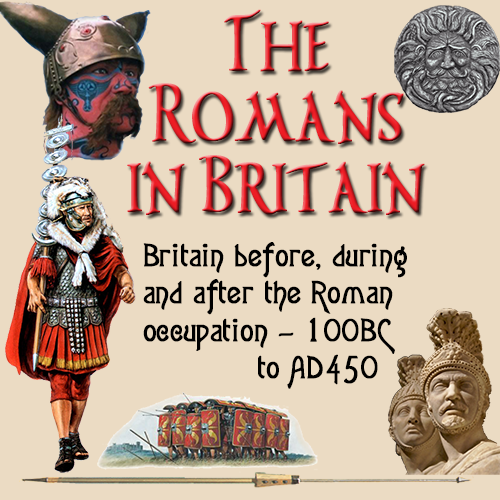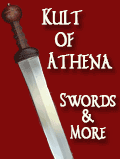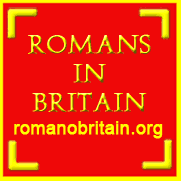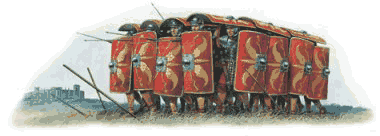Bucellatum (Roman hardtack)
by Paul Elliott: used with his kind permission, from the Roman Recruit website
B ucellatum is the Roman version of hardtack — really, unchanged over the centuries and basically the same as was later issued to soldiers int he American RevWar and Civil War. The Codex Theodosius (7.4.11) dating from 360 states that troops on the move should receive hardtack biscuits (buccellatum), bread, ordinary wine (vinum) and sour wine (acetum), salted pork and mutton. It seems that hardtack and acetum would be consumed for two days, and on the third day the decent wine and bread would be eaten. Troops were ordered to collect twenty days rations from the state warehouses before a long campaign, and carry these rations themselves.
ucellatum is the Roman version of hardtack — really, unchanged over the centuries and basically the same as was later issued to soldiers int he American RevWar and Civil War. The Codex Theodosius (7.4.11) dating from 360 states that troops on the move should receive hardtack biscuits (buccellatum), bread, ordinary wine (vinum) and sour wine (acetum), salted pork and mutton. It seems that hardtack and acetum would be consumed for two days, and on the third day the decent wine and bread would be eaten. Troops were ordered to collect twenty days rations from the state warehouses before a long campaign, and carry these rations themselves.
We have other sources which tell us how bleak the marching diet was. Vegetius remarks that soldiers should have "corn (ie. wheat, as what we call corn, i.e. "Maize" is a New World plant and unknown in Europe at this time), wine, vinegar and salt at all times". That wheat ration will have come as hardtack biscuits. The Emperor Hadrian lived the life of a regular soldier for a while (SHA, Hadrian X, 2) and enjoyed "larido, caseo et posca", which was bacon fat, cheese and sour wine (also called acetum). Ammianus (xvii) also mentions buccellatum. Avidius Cassius, a general who rebelled against Marcus Aurelius, ordered his troops to carry nothing except "laridum ac buccellatum at que acetum", ie. bacon fat, hardtack and sour wine (Avidius Cassius, v, 3).
Creating A Menu
What kind of a menu can I create, then? Obviously, buccellatum (hardtack or wheat biscuits) will feature quite highly, as will bacon and lard. Using just those ingredients Northern troops in the American Civil War concocted "skilleegalee", hardtack crumbled into bacon and hot lard. I've tried this for breakfast at events, and it does the job just fine. Buccellatum can also be fried as they come, or soaked in water till mushy and fried or put in the pot with other ingredients. Remember that hardtack is a way to preserve the wheat ration. It is essential. Wheat or barley could be carried, but would need to be ground before use, using portable millstones carried by the conterburnium's mule. Flour can be carried on its own. It is much more prone to damp and spoilage than wheat grains, but mixed with water and lard and slapped onto a flat stone warming next to the fire (or onto a frying pan) an unleavened bread can be cooked in minutes. Bread is always the major food source; flour or hardtack are essential for the legionary's survival.
Carry a dozen or more of the buccellatum in a linen bag for the campaigning season. Keep dry, or you will have maggots in your bread! To eat, soak in water, or crumble into fried bacon (larido et buccelatum), or crush up into powder and use as a flour ration in stews or to make pulmentum (below) or unleavened bread on a hot stone. Or just fry it up in lard or olive oil!
Ingredients
- 3 cups whole wheat flour
- 1 tsp salt
- 1 tbsp olive oil
Preparation
- Mix the ingredients together into a stiff batter, adding extra water or flour as needed.
- Knead several times, and spread the dough out flat to a thickness of 1cm.
- Cut the dough into squares (around 5-6cm square), and punch four rows of holes all the way into the dough.
- Bake on a non-greased baking tray for one hour at around 180 degrees.
- Keep testing the hardtack, it must be lightly browned and rock hard. Extend the cooking time if still not hard, reduce the temperature if the hardtack is browning too quickly.
- When hard allow to cool in the oven.




















